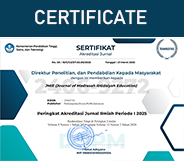ANALYSYS OF TEACHER QUESTIONING SKILLS: THE USE OF OPEN-ENDED QUESTIONS IN LEARNING
Abstract
This study aims to analyze teacher questioning activities using oral open-ended questions in class This study involved three elementary school teachers from two different schools in Yogyakarta. Samples are selected using convenience sampling techniques. The data collection technique used was two learning observations lasting 45-60 minutes using zoom meeting recordings and google meet. Records and transcripts of recordings were analyzed to find answers to three research questions. The results showed that teachers asked all kinds of questions verbally. The teacher asked two or three open-ended questions verbally. Students answer these questions with different answers. The answer is not only correct, but also false and incomplete. After getting an answer, the teacher responds by asking follow-up questions both closed and open-ended. Therefore, this study helped teachers to know the usefulness of oral open-ended questions, to understand how to optimize asking the questions orally, and to analyze the use of oral open-ended questions in the classroom. Researchers can also reflect on the way to do study related to questioning activity in which they are expected to focus on all the types of questions, the way teachers ask, students possible answers, and follow-up the answer.
Keywords
Full Text:
PDFReferences
Addini, I. R., Sukayasa, & Usman, H. B. (2018). Analisis Jenis Pertanyaan Guru Berpengalaman dan Guru Pemula dalam Pembelajaran Matematika di SMP Negeri Model Terpadu Madani. Jurnal Elektronik Pendidikan Matematika Tadulako, 6(2).
Bastian, B. (2019). Analisis Keterampilan Dasar Mengajar Guru Dalam Melaksanakan Pembelajaran Di Sekolah Dasar. JURNAL PAJAR (Pendidikan dan Pengajaran), 3(6), 1357. https://doi.org/10.33578/pjr.v3i6.7899
Brandenburg, R., Glasswell, K., Jones, M., & Ryan, J. (2017). Reflective theory and practice in teacher education. Singapore: Springer Nature Singapore Pte Ltd.
ak?r, H., & Cengiz, . (2016). The Use of Open Ended versus Closed Ended Questions in Turkish Classrooms. Open Journal of Modern Linguistics, 06(02), 6070. https://doi.org/10.4236/ojml.2016.62006
Chin, C. (2007). Teacher questioning in science classrooms: Approaches that stimulate productive thinking. Journal of Research in Science Teaching, 44(6), 815843. https://doi.org/10.1002/tea.20171
Chris Kyriacou. (2007). Essential teaching skills. Nelson Thornes. United Kingdom: Nelson Thornes Ltd Delta. https://doi.org/10.1136/sbmj.0710361
Griffin, P., & Care, E. (2015). Assessment and Teaching of 21st Century Skills: Method and Approach. Educational Assessment in an Information Age.
Hobri, Nazareth, E., Romlah, S., Safitri, J., Yuliati, N., Sarimanah, E., Harisantoso, J. (2019). The students creative thinking ability in accomplishing collaborative learning-based open-ended questions. IOP Conference Series: Earth and Environmental Science, 243(1). https://doi.org/10.1088/1755-1315/243/1/012145
Kirana, C., & Cahyowati, E. T. D. (2020). An implementation of open-ended approach with TPS (Think Pair Share) to improve creative thinking skills for student of class VII-B of SMP Negeri 9 Malang. AIP Conference Proceedings, 2215. https://doi.org/10.1063/5.0000767
Kurniawan, H., Putri, R. I. I., & Hartono, Y. (2018). Developing open-ended questions for surface area and volume of beam. Journal on Mathematics Education, 9(1), 157168. https://doi.org/10.22342/jme.9.1.4640.157-168
Kwon, O. N., Park, J. S., & Park, J. H. (2006). Cultivating divergent thinking in mathematics through an open-ended approach. Asia Pacific Education Review, 7(1), 5161. https://doi.org/10.1007/BF03036784
Lee, Y., & Kinzie, M. B. (2012). Teacher question and student response with regard to cognition and language use. Instructional Science, 40(6), 857874. https://doi.org/10.1007/s11251-011-9193-2
Ma, X. (2008). The Skills of Teachers Questioning in English Classes. International Education Studies, 1(4), 92100. https://doi.org/10.5539/ies.v1n4p92
Mihajlovi?, A., & Dejic, M. (2015). Using Open-Ended Problems and Problem Posing Activities in Elementary Mathematics Classroom. International MCG Conference, (June), 3440.
Popping, R. (2015). Analyzing Open-ended Questions by Means of Text Analysis Procedures. BMS Bulletin of Sociological Methodology/ Bulletin de Methodologie Sociologique, 128(1), 2339. https://doi.org/10.1177/0759106315597389
Retnawati, H., Djidu, H., Kartianom, Apino, E., & Anazifa, R. D. (2018). Teachers knowledge about higher-order thinking skills and its learning strategy. Problems of Education in the 21st Century, 76(2), 215230. https://doi.org/10.33225/pec/18.76.215
Romli, S., Abdurrahman, A., & Riyadi, B. (2018). Designing students worksheet based on open-ended approach to foster students creative thinking skills. Journal of Physics: Conference Series, 948(1). https://doi.org/10.1088/1742-6596/948/1/012050
Rosli, R., Capraro, M. M., & Capraro, R. M. (2014). The effects of problem posing on student mathematical learning: A meta-analysis. International Education Studies, 7(13), 227241. https://doi.org/10.5539/ies.v7n13p227
Rowell, J. A., Pope, S., & Sherman, B. F. (2019). Relating theory to practice in teacher education. Journal of Education for Teaching (Vol. 18). Singapore: Springer Nature Singapore Pte Ltd. https://doi.org/10.1080/0260747920180205
Sarwanto, Fajari, L. E. W., & Chumdari. (2020). Open-Ended Questions to Assess Critical-Thinking Skills in Indonesian Elementary School. International Journal of Instruction, 14(1), 615630. https://doi.org/10.29333/IJI.2021.14137A
DOI: http://dx.doi.org/10.32934/jmie.v7i1.495
Refbacks
- There are currently no refbacks.

This work is licensed under a Creative Commons Attribution 4.0 International License.
Copyright © 2017, JMIE: Journal of Madrasah Ibtidaiyah Education, p-ISSN: 2580-0868, e-ISSN: 2580-2739
Indexed By:





